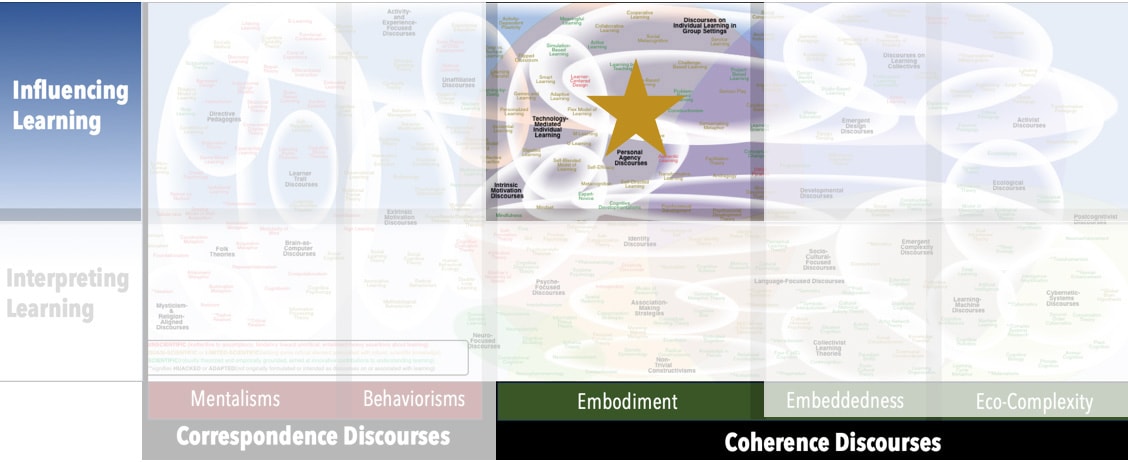Focus
Co-construction and maintenance of social rolesPrincipal Metaphors
- Knowledge is … social constructs (the meaning of an object or event by a community)
- Knowing is … fulfilling a social position
- Learner is … a participant (in a system of social positions)
- Learning is … being enculturated into a position
- Teaching is … co-participating
Originated
1990sSynopsis
Positioning Theory is a Social Constructionism that defines a “position” as an assemblage of rights and duties, which is non-permanent, situational, and disputable. It starts with the observation that positions can vary dramatically, and it focuses on the roles and deployments of discourse – including word choice, metaphor, rhetorical strategy, tone – in positioning selves and others. Precursors and associated discourses include:- Biculturalism Theory (Bicultural Competence) (Teresa LaFromboise, 1990s) – a perspective on how individuals from minority or marginalized groups successfully function in two distinct cultural environments
- Code-Switching (Language Alternation) – a notion borrowed from linguistics to describe the alternation between two or more “codes” – that is, languages, dialects, or registers. The phenomenon rose to the attention of educators in the late 1900s alongside Language Register as it became apparent that some children were compelled to operate across multiple codes.
- Language Register (Register) (T.B.W. Reid, 1950s) – the type of spoken language – that is, vocabulary, grammar, tone, volume, etc. – that is fitted to a situation. The phenomenon rose to the attention of educators in the late 1900s as it became apparent that children from diverse backgrounds were sometime unfamiliar with – and therefore disadvantaged by – the registers associated with formal education.
- Negotiated Order Theory (Anselm Strauss, 1970s) – a literalization of the metaphor of negotiation, in the suggestion that all social order is negotiated order – that is, social action is an ongoing process of negotiation, subject to the constraints of culture and situation
- Role Theory (Ralph Linton, George Herbert Mead, 1940s) – a model of human action grounded on the assumption that everyday behaviors are matters of playing out socially defined roles, which are seen to be governed by societal norms – that is, culturally determined expectations of and boundaries on acceptable behaviors for particular roles
- Situated Identities Theory (C. Norman Alexander, Mary Glenn Wiley, 1980s) – aa assertion that one takes on different identities – that is, different traits, different behaviors, and different roles – in different social and cultural situations
- Social Role Theory (Alice Eagle, 1980s) – a perspective on the relationship between sex differences and social behavior that asserts differences across these categories are matters of cultural standards, not biological factors
- Standpoint Theory (Nancy Harstock, 1980s ... although argued to be rooted in the work of Georg Wilhelm Friedrich Hegel in the early 1800s) – Oriented by the realization that one’s knowledge and sensibilities are shaped by one’s unique-but-multifaceted social and political experiences. Standpoint Theory asserts that one’s complex and evolving knowledge is the source of one’s authority. It is typically invoked as a frame from which those in marginalized groups can critique, challenge, and overturn constructs of normality and status quo. Subdiscourses include:
- Feminist Standpoint Theory (Standpoint Feminism) (various, 1980s) – a version of Standpoint Theory that highlights the possibility that social and political positions dominated by women might be leveraged to investigate issues into both the marginalization of some and the privilege of others
- Indigenous Standpoint Theory (Martin Nakata, 2000s) – a version of Standpoint Theory that is concerned with the ways that Indigenous peoples’ epistemologies might constrain and/or enable their participation in broader spheres
- Translanguaging (Cen Williams, 1980s) – a variously interpreted notion applied to practices of using more than one language in a lesson. In education, Translanguaging most often refers to the fluid alternation between two languages, in contrast to sharp separations of uses and contexts of use. In another usage, Translanguaging refers to the tendency of multilingual speakers to anchor their meanings and interpretations in the first or primary languages.
Authors and/or Prominent Influences
Michel Foucault; Bronwyn Davies; Rom HarréStatus as a Theory of Learning
Positioning Theory is a theory of learning, provided one is attentive to the fact that the dynamic, self-maintaining system in this instance is not a solitary individual but a social collective.Status as a Theory of Teaching
Positioning Theory is not a theory of teaching, but it can be applied to analyze role norms and social inequities in any social setting – including classrooms, playgrounds, staffs, and so on.Status as a Scientific Theory
See Social Constructionism.Subdiscourses:
- Biculturalism Theory (Bicultural Competence)
- Code-Switching (Language Alternation)
- Feminist Standpoint Theory (Standpoint Feminism)
- Indigenous Standpoint Theory
- Language Register (Register)
- Negotiated Order Theory
- Role Theory
- Situated Identities Theory
- Social Role Theory
- Standpoint Theory
- Translanguaging
Map Location

Please cite this article as:
Davis, B., & Francis, K. (2024). “Positioning Theory” in Discourses on Learning in Education. https://learningdiscourses.com.
⇦ Back to Map
⇦ Back to List
